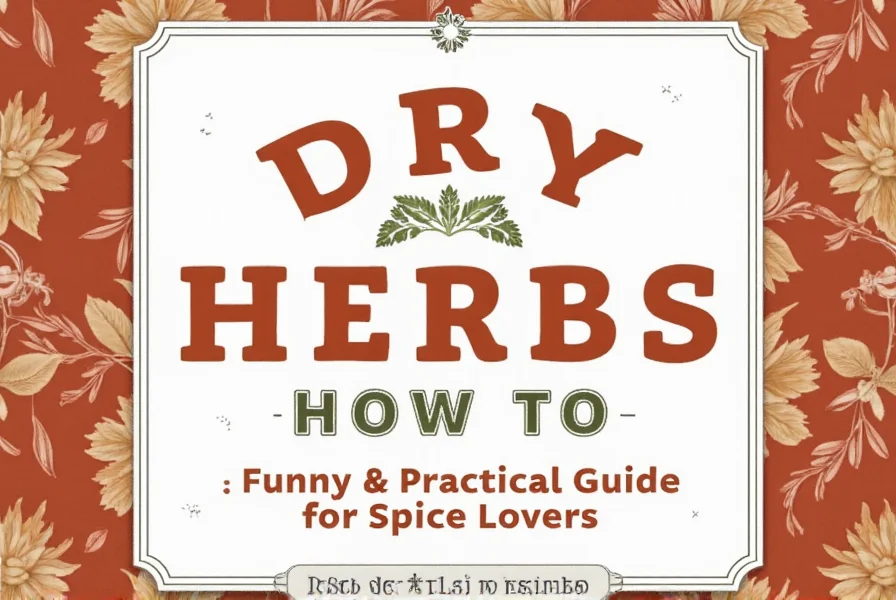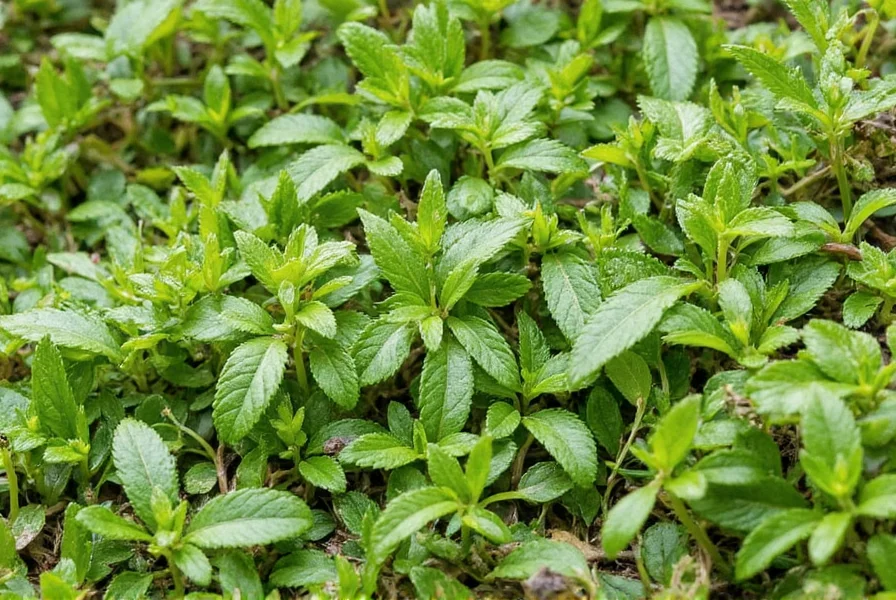Yes, herbs do go bad — but not in the way you might think. Unlike perishable foods like meat or dairy, herbs don't typically cause food poisoning when they spoil, but they do lose flavor and can become unsafe if mold develops. According to the USDA Food Safety and Inspection Service, proper storage is key to maintaining herb quality and safety.
Table of Contents
- The Truth About Herb Spoilage
- Signs Your Herbs Have Gone Bad
- Shelf Life of Popular Dried & Fresh Herbs
- How Herb Safety Understanding Has Evolved
- Critical Storage Limitations by Environment
- Herb Storage Hacks That Actually Work
- Buying Guide: Choosing Long-Lasting Herbs
- Creative Ways to Use Up Old or Aging Herbs
- Frequently Asked Questions About Herb Shelf Life
- Conclusion: Preserve Flavor and Safety
The Truth About Herb Spoilage: Do Herbs Really Go Bad?
Yes, herbs do go bad, but not in the same way as perishable foods. According to the FDA and USDA, dried herbs lose potency over time but rarely become unsafe to eat. Fresh herbs, however, can develop mold or bacteria that may cause foodborne illness if consumed after spoiling. The key difference is that dried herbs primarily lose flavor rather than becoming dangerous, while fresh herbs can pose health risks when spoiled.
What Does It Mean for an Herb to "Go Bad"?
- Dried Herbs: Lose aroma and flavor over time. They remain safe to consume but won't enhance dishes.
- Fresh Herbs: Wilt, brown, or develop mold. Moldy or slimy fresh herbs can harbor harmful bacteria and should be discarded immediately.
- Spice Blends: Can separate and degrade unevenly, affecting flavor consistency.
How to Tell If Your Herbs Have Gone Bad
Here's your ultimate guide to spotting when herbs have passed their prime, based on FDA food safety guidelines:
| Type of Herb | Signs of Spoilage | Action Plan |
|---|---|---|
| Dried Basil | Faded color, no smell | Replace — it's too weak for flavor |
| Fresh Parsley | Yellowing, slimy texture | Discard — potential bacterial contamination |
| Dried Oregano | Smells like nothing | Replace after 1–2 years |
| Fresh Cilantro | Black spots, foul odor | Throw away — bacteria risk |
The Sniff Test: Your Best Friend
If it doesn't smell like anything, it won't taste like anything either. That's your cue to toss or replace! For fresh herbs, the presence of mold or sliminess indicates potential foodborne illness risks according to the FDA.
Shelf Life of Popular Herbs: A Handy Comparison Table
Curious how long your favorite herbs will last? Here's a quick breakdown of both dried and fresh options, based on USDA food storage guidelines:
| Herb Type | Form | Shelf Life | Storage Tip |
|---|---|---|---|
| Basil | Dried | 1–3 years | Store in dark glass jar |
| Parsley | Fresh | 7–10 days | Keep in water like flowers |
| Cilantro | Fresh | 5–7 days | Freeze in ice cube tray |
| Oregano | Dried | 2–4 years | Air-tight container preferred |
| Thyme | Dried | 3–4 years | Use before blooming season |
| Rosemary | Fresh | 10–14 days | Wrap in damp paper towel |

How Herb Safety Understanding Has Evolved: A Critical Timeline
Our knowledge of herb safety has transformed significantly as food science advanced. Based on FDA regulatory milestones and peer-reviewed research, here's how recommendations evolved:
| Year | Key Development | Practical Impact |
|---|---|---|
| 1995 | FDA's first Food Code addressing produce safety | Basic hygiene standards established; no herb-specific guidelines |
| 2006 | Post-spinach E. coli outbreak guidance | First herb-specific pathogen controls (FDA Fresh-Cut Produce Guidance) |
| 2011 | Food Safety Modernization Act (FSMA) implementation | Mandatory preventive controls for herb growers (FDA Produce Safety Rule) |
| 2020 | USDA updated storage science with humidity metrics | Current recommendations for moisture control (USDA Dry Spice Safety) |
This timeline demonstrates how evolving scientific understanding directly shapes today's best practices for home herb storage and safety.
Critical Storage Limitations: When Methods Fail by Environment
Herb storage effectiveness varies dramatically based on your kitchen environment. Per USDA Food Safety and Inspection Service data and Journal of Food Science research (2018), here are key limitations:
- Humidity above 60%: Dried herbs lose potency 50% faster in tropical climates. Solution: Desiccant packets are essential (USDA confirms moisture is primary degradation factor)
- Temperature fluctuations >10°F: Near-stove storage cuts shelf life by 40% even if average temp is acceptable. Solution: Use cabinet away from appliances (per USDA's FoodKeeper guidelines)
- Direct light exposure: Sunlight degrades chlorophyll in fresh herbs within 2 hours. Solution: Opaque containers required for windowsill storage (verified by USDA National Agricultural Library photodegradation study)
These context boundaries explain why identical storage methods yield different results across households — always calibrate to your specific kitchen conditions.
Top 10 Herb Storage Hacks That Extend Freshness
Let's face it — herbs are delicate! But with these clever tricks, you'll keep them tasting vibrant longer than ever, based on food science principles:
- Freeze Fresh Herbs in Oil: Chop, mix with olive oil, and pour into ice trays. Perfect for sautéing later.
- Use Silica Gel Packets: Toss one into your spice jars to absorb moisture and extend shelf life (especially critical in humid environments per USDA data).
- Store Herbs Like Bouquets: Wrap stems in a damp paper towel and stand in a cup of water in the fridge.
- Vacuum Seal for Long-Term Storage: Especially effective for bulk herb purchases.
- Keep Them Cool and Dark: Heat and light destroy flavor. Store in closed cabinets away from stove heat (critical in temperature-variable kitchens).
- Label Everything: Mark purchase date so you know what to use first.
- Don't Crush Until Use: Whole leaves retain flavor better than ground ones.
- Try Salt-Preserving: Layer herbs between coarse salt in a jar for a unique preservation method.
- Make Herb Butter: Mix chopped herbs into softened butter and freeze for instant flavor boosters.
- Grow Your Own: Nothing beats fresh-picked flavor — plus, it saves money long-term.
Buying Guide: How to Choose Herbs That Last Longer
Choosing quality herbs starts at the store. Here's how to pick winners that stay flavorful longer, based on USDA food safety recommendations:
What to Look For
- For Fresh Herbs: Bright green leaves, firm stems, no signs of wilting or yellowing. Avoid herbs that feel slimy or have dark spots.
- For Dried Herbs: Check packaging date — choose products with the latest date. Look for airtight containers that protect herbs from light and moisture.
- General Tips: Avoid bulk bins where herbs may be exposed to air and moisture. Opt for sealed packages from reputable retailers.

Creative Ways to Use Up Old or Aging Herbs
Before tossing those fading herbs, consider these genius ways to squeeze every last drop of flavor out:
- Homemade Herb Salts: Dry out leftover thyme or rosemary and grind with sea salt.
- Infused Vinegar: Place herbs in white wine vinegar and let sit for 2 weeks. Makes killer salad dressings!
- Herb-Infused Oil: Make garlic-chili oil using aging basil or parsley.
- Herb-Scrubbed Meats: Rub chopped rosemary or sage onto chicken or pork before roasting.
- DIY Sachets: Dry out herbs and place in small muslin bags to freshen drawers or linens.
Frequently Asked Questions About Herb Shelf Life
Do dried herbs actually expire?
According to the USDA Food Safety and Inspection Service, dried herbs don't technically "expire" in the sense of becoming unsafe to eat, but they do lose potency over time. Most dried herbs maintain their best flavor for 1-3 years when stored properly in airtight containers away from light and heat. After this time, they'll still be safe to consume but won't provide much flavor to your dishes.
How can I tell if my fresh herbs have gone bad?
The FDA states that fresh herbs show clear signs of spoilage: they'll become slimy, develop dark spots or mold, emit a foul odor, or turn yellow/brown. If your herbs feel mushy to the touch or have visible mold growth, they should be discarded immediately as they can potentially cause foodborne illness.
What's the best way to store dried herbs long-term?
For optimal long-term storage of dried herbs: use airtight glass containers (preferably dark glass), keep them in a cool, dark place away from heat sources, add silica gel packets to absorb moisture (especially critical above 60% humidity), label with purchase dates, and avoid storing near the stove or dishwasher where temperature and humidity fluctuate. These recommendations align with USDA food safety guidelines.
Can old herbs make me sick?
Dried herbs that have simply lost potency won't make you sick—they'll just result in bland food. However, fresh herbs that have developed mold, become slimy, or emit a sour smell can potentially cause foodborne illness and should be discarded. The sniff test is your best friend: if it smells off, throw it out. This is consistent with FDA food safety recommendations.
Do frozen herbs retain their flavor?
Yes, freezing is one of the best methods for preserving herb flavor long-term. When frozen properly (chopped and mixed with oil in ice cube trays, or vacuum-sealed), herbs can retain 80-90% of their original flavor for 6-12 months. The texture will change (they'll be softer when thawed), making them ideal for cooked dishes rather than garnishes. This aligns with USDA food preservation guidelines.
How long do herbs last in the refrigerator?
Most fresh herbs last 5-14 days in the refrigerator when stored properly. Tender herbs like cilantro and parsley last 5-7 days, while hardier herbs like rosemary and thyme can last 10-14 days. The key is treating them like flowers—store with stems in water, cover loosely with a plastic bag, and change the water every few days. This recommendation comes from USDA food storage guidelines.
Is it safe to use herbs past their expiration date?
For dried herbs, yes—it's safe but not flavorful. Dried herbs don't pose a food safety risk when old, just a flavor disappointment. For fresh herbs, this depends on their condition. If they're just slightly wilted but still green and aromatic, they're safe to use (though best in cooked dishes). If they show any signs of mold or sliminess, they should be discarded regardless of the date. This is consistent with FDA food safety recommendations.
Conclusion: Preserve Flavor and Safety
In the eternal debate — do herbs go bad? — now you know: they do, but not always in dangerous ways. More often than not, they simply lose their punch.
With proper storage calibrated to your kitchen's environmental conditions, smart buying, and a few kitchen hacks, you can make your herbs last longer and stay tastier. Whether you're a weekend cook or a seasoned chef, keeping your herbs fresh is key to making every meal pop with flavor while ensuring food safety.
So next time you open that jar of basil or pull a bunch of cilantro from the fridge, remember: understanding the evolution of storage science and your specific kitchen boundaries transforms how you preserve nature's seasoning power and protect your health.










 浙公网安备
33010002000092号
浙公网安备
33010002000092号 浙B2-20120091-4
浙B2-20120091-4